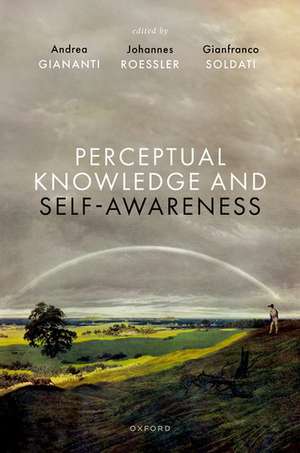Perceptual Knowledge and Self-Awareness
Andrea Giananti, Johannes Roessler, Gianfranco Soldatien Limba Engleză Hardback – 26 dec 2024
Preț: 529.02 lei
Preț vechi: 757.25 lei
-30% Nou
Puncte Express: 794
Preț estimativ în valută:
101.27€ • 104.15$ • 84.02£
101.27€ • 104.15$ • 84.02£
Carte disponibilă
Livrare economică 16-22 ianuarie
Preluare comenzi: 021 569.72.76
Specificații
ISBN-13: 9780192869074
ISBN-10: 0192869078
Pagini: 272
Dimensiuni: 160 x 240 x 20 mm
Greutate: 0.56 kg
Editura: OUP OXFORD
Colecția OUP Oxford
Locul publicării:Oxford, United Kingdom
ISBN-10: 0192869078
Pagini: 272
Dimensiuni: 160 x 240 x 20 mm
Greutate: 0.56 kg
Editura: OUP OXFORD
Colecția OUP Oxford
Locul publicării:Oxford, United Kingdom
Notă biografică
Andrea Giananti holds an MA from the University of Milan, an MLitt from the University of Glasgow, and a PhD from the University of Fribourg. His work lies at the intersection of epistemology and philosophy of mind, and he is particularly interested in issues in the philosophy of perception, self-knowledge, rationality, and action.He has worked as a Lecturer at the University of Fribourg, and as Deputy Professor of epistemology at the University of Bayreuth. Currently, he is a Research Consultant at the University of Lausanne.Johannes Roessler holds an MA from Tübingen University and a DPhil from Oxford University. He was a Prize Fellow at Magdalen College and subsequently joined the Philosophy Department at Warwick University (initially as a research fellow in an interdisciplinary project on Consciousness and Self-Consciousness, directed by Naomi Eilan), where he is now a Professor. His main research interests are in epistemology and the philosophy of mind and action. He has published numerous articles on self-knowledge, perceptual knowledge, and reason-giving explanation, and he has co-authored a series of articles with Josef Perner on children's understanding of intentional actions. He is co-editor of three interdisciplinary volumes, published by OUP.Gianfranco Soldati obtained his Licence ès Lettres at the University of Geneva and his PhD at the University of Tübingen. He has been doctoral assistant in Geneva and post-doctoral assistant in Tübingen. He holds the chair for modern and contemporary philosophy at Fribourg University since 2000. He works on phenomenology, mind and knowledge. Among other things he is interested in problems related to perception, action, reason, self-knowledge, and in the philosophical analysis of experience.
